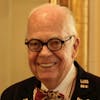Culinary-Forward Luxury Hospitality - Ed Skapinok, Appellation

Appellation is a new culinary-forward luxury hotel company co-founded by chef Charlie Palmer and Christopher Hunsberger, the former president of Four Seasons Hotels and Resorts. In this episode, we speak with Ed Skapinok, the company's chief commercial officer, about the origins of the brand and its unique approach to providing hospitality.
Join the conversation on today's episode on the Hospitality Daily LinkedIn page.
Josiah:
Appellation is a new culinary-forward luxury hotel company, co-founded by Chef Charlie Palmer and former president of Four Seasons, Christopher Hunsberger. Today, we're speaking with Ed Skapinok, the company's chief commercial officer, about the origins of the brand and its unique approach to providing hospitality.
Ed:
So, Appellation, as a brand, we're positioned in what we call approachable luxury, at the four-and-a-half-star service level. Now, our co-founders are two exceptional individuals. Chef Charlie Palmer is a renowned chef and restaurateur. He was James Beard Best Chef in America. He's got 20 Michelin stars to his name. He's going to go down as one of the greatest American chefs in history and has been very successful over a 20-year career having his own restaurant company. And then, our other co-founder is Christopher Hunsberger, who had a 30-year career with Four Seasons, led innovation for them, oversaw food and beverage as well, and eventually, went on to be president of the Americas and global head of human resources for the company. We've got great co-founders, we've got great DNA. Really, what we're doing is executing their vision for a different approach to hospitality, and one where you've merged culinary and hospitality in a truly different way than we've seen before.
And so, our brand, while our name means to give a name to a place, we are very culinary forward in our approach and I think are innovating in that space in ways that we haven't seen before in our business. So, the brand appeals to people that have experience staying in luxury hotels, they have experience with great culinary, they're adventuresome by nature, and I think in a lot of ways culinary is an adventure to them and they like to see what's behind the scenes and understand the inner workings a little bit more. And so, we've literally designed the brand to be a luxury hotel brand, but our guests are absolutely going to feel like they're very much connected with what's going on at the hotel, with the people that work there, and the communities that we're in.
Josiah:
Do you see demand for culinary offerings increasing over time?
Ed:
I think so. Most people now when they travel, they'll tell you that food and beverage is an important part of their planning and their decisions about where to go, and then what to do when they go someplace. We certainly see that with the popularity of restaurants and the locations where we're developing, and we're thrilled about that because we don't go into an area and pretend that we know better because we don't. Sure, we've got great experience and I think we've got a lot of talent on our team, but we look at it as the places where we're going to be successful as a hotel, they're going to be places where there is already a lot of interest or talent or intrigue about what is so great on the culinary scene there. We're very meticulous about making sure that we complement what happens in a market before we enter, and that we can really do something to enhance it rather than try and change it. And the concept has been really well-received.
Josiah:
We're sitting here in Healdsburg, Northern California, and it's been fascinating to watch even, in this small community, a lot evolve over the last couple of decades on that scene. And if you think about the locations you're looking at, it's all my favorite locations in California. I wonder if you could speak a little bit to site selection and where you're looking at opening up because that plays a big role in how your brand will evolve.
Ed:
Yeah, it sure does, and it already has. When we consider a site, we go through a process that we call soul-searching, and we only start with places that we love. I mean, that's actually a qualitative criteria that we have is, do we love this place? Could we see ourselves really being happy, having an operation here, having staff here that works for us, being involved in these communities? That's always the point of entry. And then, the process of soul-searching, we really do spend a lot of time and effort really trying to get to the heart of what makes that destination so special. And in some places, it's a little more obvious than others, but we try and look past what's obvious and say, "Really, what is the heart of this community, the soul of this community? And then, how can we design our programming to really be an enhancement of that?"
Healdsburg is a great culinary destination, and a lot of it gets back to the roots of when Charlie came to this market over 20 years ago and opened the renowned restaurant Dry Creek Kitchen. Charlie was living in New York. He and his wife decided they wanted to move out here and raise their family. They've loved wine country, always. And when he opened up Dry Creek Kitchen, it was a catalyst for new culinary development in Sonoma County. And that was about the same time that Thomas Keller was doing some really great things over on the Napa Valley side with French Laundry, and some very renowned restaurants there. And that's absolutely developed into a great place for culinary visitors.
But Sonoma County has always been a little bit quieter about who it is. It's no longer a well-kept secret. I think people that know food, they know wine, they want to be able to dine in a cafe in the morning, go to the redwoods in the afternoon, and then see the sunset on the coast in the evening. And all the while, have great food and drink. I think that they know about places like Healdsburg.
Josiah:
Before we started recording, you were talking about having a conversation with someone about a potential project. And this person was saying, "We can't run a comp set report," which is typically how the industry works, regardless of where you are. It seems that you're looking at these high barrier-to-entry markets. Is that intentional or is that just a byproduct of looking for places that have that soul?
Ed:
Yeah, it's mostly intentional, but I think that's also when you think about the types of places where we feel like we would be really successful, they tend to be higher barrier to entry markets. Yes, in a lot of cases, through our development partners, we've been able to find locations that are very special. In some cases, we may be the last hotel ever built in places like Healdsburg, or our project on the coast in Pacific Grove, California, right on Monterey Bay, I don't think it's an exaggeration to say it'll be the most significant coastal hotel development in California for the next 10 years. So, yes, I think that's a big part of our appeal is that we've been able to identify certain locations and start the development process in places that there's unaccommodated demand for a hotel like ours, there's definitely, no pun intended, an appetite for new culinary experiences that I think we can add.
But something that's happening organically with the brand, and this has started to happen just over the last two years or so, as developers are bringing projects to us now, is we are starting to evaluate markets that we weren't as certain about in the past. And we are finding some real diamonds, not even in the rough, but just uncovered diamonds that, as we work on some of these projects, we think over the next few years we're going to be debuting some of hotels that might surprise people that we're in those markets, but it's going to become immediately apparent why we are as soon as we open.
Josiah:
To me, this is almost the power of marketing, or branding, or brand storytelling. And hopefully, this conversation we're having now plays a role in that-
Ed:
Absolutely.
Josiah:
... because I spent my whole career in marketing, and I find the more you talk about this stuff, it can almost take a life of its own, and people start telling people. And it's really powerful, if you believe you're creating something that the world needs to know about, it's almost your duty to invest in telling that story. I know it's a little self-interested because I'm running the show. It's interesting you mentioned Pacific Grove because I know that area very well, and it's my favorite part of the Monterey Peninsula by a long shot. Nearly impossible to do a project in, especially one at scale. And so, I think that just speaks to the quality of your team, the collaborators you're working with because it's an exceptional place. But these kind of projects are real estate projects, they're development projects, and so you need to understand how that world works.
Ed:
Absolutely. We definitely do. And I think the best way to get any development project done, especially in an area that is on the coast, is I think you've got to embrace the community, and let them know who you are and what your intentions are very early on in the process. But if you do that, then there's always questions about, what is this, and is it going to be the right fit for our community? And so, we put a lot of effort upfront into that, to making sure that we're communicating with the local community. In most of these places, many of us have lived or worked there in the past. But yeah, I think that's essential for any developer in any industry is to don't go in and create a mystique about what you're doing. It's much easier to win support for a project if you're upfront with people, and actually listen to their feedback and act on it. It definitely makes for a more effective development experience.
Josiah:
What is Appellation's Crafted at Appellation program?
Ed:
One of the unique things about the brand that we decided early on that we wanted to do was to embrace the local makers and artisans, and find a way to make them part of the guest experience. And so, we have an immersive learning expert on staff and somebody that is working with us to build out an entire program of immersive learning experiences. Some of these could be informal. We invite a local coffee roaster to come in on a Saturday morning and lead a cupping activity with our guests in the lobby, so that they can experience how to taste coffee in different ways. And others are more formal classes, things that we actually have an expert there, we sell tickets to it. Others are also for private events. That's become quite popular to have, not just corporate team building, although that's been quite popular, but even on a social group to be able to do something that's a little more experiential.
But the idea is that we have these local taste-makers, these local experts leading these activities. And it's not just visitors that attend them, it's also members of the community, the locals come in. And so, we have a catalog of classes and prior to opening any of our hotels, we do pop-up classes in that market. Typically, they're at a local winery or someplace that we know, and we really feel strongly about, places that we love to support that we think will be good partners for us even once the hotel is open. So, we lead these pop-up activities. And it's a little bit of R&D because we get some feedback about in the absence of a hotel guest, what resonates with the local population? What times of day? What types of classes? Just all kinds of feedback that we're getting before opening up the hotels.
And then, once the hotels are open, we'll have weekly a series of classes that are just happening throughout different days and times at the hotels. And we've actually designed physical spaces that we call maker spaces inside the lobbies of our hotels for these. And so, they're essentially glass-walled rooms that are in the lobby. So, even if it's just a local jewelry maker just sitting there making jewelry all day and just explaining to our guests their process or the types of materials that are used locally, that person is able to have that space to do that. In other cases, that jeweler may be leading a class, or it could be one of our members of our culinary team leading a class, and we have guests that are in there.
And then when those spaces aren't being used for that purpose, then they become private dining spaces or meeting spaces. It could also be used as overflow if our restaurant is busy or if our bar is busy. So, we talk about one space, many uses when we design these hotels, but the maker spaces and being able to provide a location for local makers and artisans to interact with our guests is definitely an important part of the physical space and the guest experience at the hotels.
Josiah:
That's pretty cool. What's in it for the makers?
Ed:
Obviously, they're compensated. It also helps with their following-
Josiah:
Oh, wait, they're compensated? So, they're not paying rent for the space?
Ed:
They're not paying rent for the space.
Josiah:
And they might even be compensated?
Ed:
Yes, so we provide all the space for them, and they're an important part of the experience. They're certainly compensated for their time and materials. We like having them there, and so we want to make it easy and desirable for them to be there because we think it's a much richer and interesting way to experience a destination when the guests can, in between going out and wine tasting and hiking and doing all the great things they love to do when they go to some of the places we have hotels, they have a chance to interact with the local taste-makers. And we just think it's a much more robust way to experience a destination.
Josiah:
I love it. I love it. I think it's a big investment to create those spaces. It takes a lot of coordination to put this kind of stuff together. But you and I were talking a little bit about development and real estate. Is there something you think you uniquely have as a hospitality company relative to other types of buildings or real estate that allows you to become almost a platform for these makers or for people in the community?
Ed:
We always say that our hotels will never look out of place because we do put so much time and attention into designing the buildings, the materials that we source, that everything really reflects the character of that destination. So, I think we're a place that people are proud to work. I think that when people stay with us, they feel like they're staying in a conscientious place that understands community, embraces that sense of community, and everything that we do really fits there.
Josiah:
I love it. I think kind of staying on that theme a little bit, you talked about a little bit of the origin story, how some of Charlie's restaurants were driving 70% of revenues from non-guests. That's a big number. And I'm curious, what's the role in engaging guests versus non-guests? Do you think about those ratios or are you just focused on the offerings and see whoever comes can come?
Ed:
Yeah, that's a great question, and I think that's one of the things that does differentiate us quite a bit from other hotel brands and other hotel companies. I'm of the belief that some of our best customers that we do business with over the years may never once stay overnight in one of our hotels. And that impacts our approach to everything, our marketing, our guest experience, how we collect and use customer information. If you think about it, we've got so many opportunities for people to interact with us. Yes, staying overnight is one of those, but we've got signature dining, Charlie Palmer signature restaurants at all of our hotels, rooftop bars, spas, experiential and immersive learning experiences. There's any number of ways that people can interact with us.
And most hotel companies, understandably, because rooms tends to generate the most revenue and the highest levels of profit, are focused squarely on the room, and then everything flows from there. And that almost makes everything else seem like an afterthought. We don't use the term ancillary revenues because that implies that they're optional. And for us, I think that's part of what our guests want when they come to us. Sure, we'll have people that stay with us and they book a room and then they stay a weekend and then they leave, and that may be it. But we're not devoting any marketing resources towards those guests.
We're really looking for the guests that want to experience all of these different attributes that we have at the hotels and in the destination. And that's why we do so much to bring that destination into the hotel environment because we want that to be part of the guest experience, and we know that everybody's going to go out as well. They might dine with us one night and then they go out and try any number of great restaurants in the area that we could recommend. But overall, there's a lot that people can do and experience even if they're not staying overnight.
Josiah:
It's got to be really exciting to be a part of all this. Because I've worked with a lot of revenue and commercial leaders over my career, and there's a lot of talk of ancillary revenue. And I guess my question for you would be, I think beyond it being exciting, would you say that you're creating a strategic advantage by diversifying your revenue streams beyond just rooms, and maybe a little money on the side? It seems like you're trying to build a very complex, holistic business.
Ed:
We definitely are. We definitely are. And I think that's actually the byproduct is the diversification. I think leading with what's the superior guest experience? What are guests really going to think about and love? And when they have memories of their visit, what is it that they're really thinking about? But yes, practically speaking though too, some of it is economics. Where we're located with the outlets that we have, it's reasonable to think that somebody who dines with us once a month and uses our spa and then goes to a couple of classes a year through our crafted programming could spend more in a calendar year than somebody who comes and stays with us over a three-day holiday weekend once a year. And most hotels, and you know this from your background and revenue management, most hotels are focused on getting that room, and then will hope that maybe something else comes along.
One thing with Charlie Palmer's restaurants inside hotels, and we've got data that goes back almost 20 years on this, about 70% of his revenues come from non-guests at that hotel. And the key here is it's not just the locals, which absolutely we are very focused on our local communities, but it's also guests that are staying in other hotels. And so, that's very powerful. If you think about it, a traveler has already decided whether they're staying with us or not, that they want to come to that destination and that they want to dine in one of our restaurants. And so, that's a huge advantage I think that we have in terms of appeal, that we can have those visitors with their perspectives coming in to dine in our restaurants and interact with our guests, interact with the locals. And just from a dollars and cents standpoint, that's a very powerful asset to have that we have that kind of appeal in our dining outlets.
Josiah:
It's hard to think of a bigger win than getting a guest staying at another hotel dine at one of your properties.
Ed:
When for the last 20, 30 years, we've all been struggling just to get our guests to dine in our hotels in other companies as an industry. Absolutely.
Josiah:
As an industry, definitely not your properties.
Ed:
Absolutely. Not our properties, no.
Josiah:
But not Charlie. Because this is, I think where Charlie's background's really interesting because he's been doing this for decades, and he shared some of the numbers. He has a track record. And to my knowledge, was the first chef with renown who started working at a hotel and almost changed the script, which you said, unfortunately in the industry is like hotel restaurants are sad. And he played a big role in changing that, right?
Ed:
He did. He really did. And that's when Chris and Charlie got to know each other, our co-founders. Chris was leading F&B for Four Seasons, and this was over 20 years ago. And they had a restaurant that was struggling at one of their resorts. And the owners of that resort said, "Either you get this thing turned around or we're going to take the keys away from you, and bring in another operator to run the restaurant there." And so Chris interviewed a number of celebrity chefs. That was the first time Four Seasons had ever considered a celebrity chef for any of its outlets. And these are household names that you would recognize. And throughout the process, he and Charlie realized that was the right fit.
And that restaurant is still the same concept it was 20 years ago. It's the Charlie Palmer Steak restaurant inside the Four Seasons in Las Vegas. And it's hard to have the same concept for 20 years in any luxury hotel, let alone one that's in Las Vegas in a market like that. So, it just goes to show the staying power there. And so, they built a business friendship and then an outside of business friendship, and started working together on other hotel projects. And then, ultimately, sold their interest in another hotel portfolio that they were a part of to be the seed capital to start this company five years ago.
Josiah:
The fact that Chris interviewed a lot of celebrity chefs seems to mean that it's not enough just to have celebrity. It seemed like there was something that was important to make this work in a hotel or resort building. Is that fair to say?
Ed:
Yeah, absolutely. I think so. And I think that continues forward now. And the approach of whatever restaurant we do, sure it's going to be appealing on the sign outside, but really, it's that service experience, what happens inside the restaurant. Is the culinary programming creative? Is it representing local properly? In some cases, we've even talked about with Charlie about Sun Valley, Idaho, Ketchum, Idaho, great mountain resort destination. And somebody asked him, "What type of cuisine will you have there?" And his response was great. He says, "I don't know exactly yet. We may even have to create it, but it's going to be something that is just perfect for that market." And I love that that's the open-minded approach going in to any of our locations as opposed to, "Oh, we've already got a concept. We'll just go deploy it over here in locations A, B, and C."
Josiah:
Yeah, it's very bespoke to each location, whether it's there or here in the Healdsburg area, or the Monterey Peninsula. There's a lot of money in these places. So, it's very exciting to think about these properties becoming these sort of community hubs. And I'm not eating at the restaurant because I have to. I'm stranded in this remote location. But people decide to come from their homes or from other hotels even.
Ed:
That's right. And one of the things that we've been intentional about being a new company is growing the portfolio, but also, being very deliberate about how we grow and where we grow. And right now, we're primarily focused on the Western US. I think the brand absolutely translates nationally. For the time being, we're primarily focused west of the Rockies, just because we want to make sure that we're all able to personally get to any of our locations on short notice if necessary, and just make sure that we've got that connection to our hotels. But with the destinations that we've identified and the ones we have in our pipeline right now, really we're able to isolate it to about five geographic feeder markets, and that creates a lot of efficiency for the brand as well.
And a lot of opportunity I think, for travelers that stay with us in one location, to have access to any number of locations, and really build an affinity for the brand. That's a big part of our marketing efforts is to make sure that we're really being deliberate in those key feeder markets. We'll probably have people stay with us from all over the world, no doubt, but where we deploy resources, we can concentrate those onto the both leisure side and the group side, I think, and really help all of our hotels portfolio-wide.
Josiah:
You've both been involved with [inaudible], as well as overseeing marketing and branding teams for some time across different organizations. I'm curious now, we're recording this summer of '23, what are you interested in or excited by in getting the story out? You mentioned these key feeder markets. I'm curious what's on your radar and how do you tell this story?
Ed:
Yeah, I think there's a couple of things that excite me about this. I mean, obviously, being a new brand, I think that's really exciting. And my feet hit the floor every morning, and I can't wait to get the word out about what we're doing. And it's really invigorating because we really just told the world just a little over a year ago. It was the summer of '22 that we debuted the Appellation branding and told the world that we exist. And it's been really well-received since then, and created a lot of inquiry and a lot of intrigue. Developers, people with hotels that are interested in our branding or our brand platforms. And the biggest thing, the most exciting thing is the number of people that have inquired about coming to work for us, and that tells me that we're creating something that's unique and interesting. Because labor is in such short supply right now, and it is so important to have people even, in some cases, a year or two before we open, asking about coming to work for us. That means a lot.
Josiah:
I think that speaks to the creativity of the concept of the brand, of the leadership team that you've assembled, and the founders and other leaders. But you are also telling me about something you're doing interesting on the development front to create housing. I wonder if we could speak for a little bit about that because that stood out to me.
Ed:
Sure. I think that's just part of being a responsible operator in great destinations. So, where we can, we develop affordable housing as part of any of our development projects. In a market like Healdsburg here, we have affordable housing units that we're intending to make available for non-management staff. There's a process here in the community where others can apply if they meet certain income qualifications, but our hope is that the majority of those units will still be available to non-management staff. In a market like Sun Valley, we actually have an entire building. It's just minutes from the slopes in downtown Ketchum. It's probably going to be the most desirable employee housing many of us have ever seen or experienced.
And we think that by building that into our projects, it helps us attract and retain the best talent in the market. Because some of these places, affordable housing is an issue, and so we try and fix that problem or at least help be part of the solution, so that quality of life for the employees is much greater. And we think that that's also part of the reason that people are interested in coming to work for us.
Josiah:
Yeah, a big part of any success of a hospitality brand is people that work there. And so, on every level. You want to attract talent on every level of the organization.
Ed:
Definitely.
Josiah:
And I think this gives you a significant advantage, which is exciting to see. Any questions I did not ask about the culinary program before we move...
Ed:
We often get asked about what it really means to be culinary-first hotel company, and there were comparisons early on to young Kimpton Hotels or Nobu, which are renowned for their dining that they have at the hotels. And in many cases, the dining is really the lead story there. Great places that we all love. But I think one thing that's a little bit different from those is, yes, we have great restaurants, we've got Charlie Palmer food and beverage. We've really designed even the physical spaces to be culinary first. From the moment you enter, lobbies don't look like traditional hotel lobbies. They look more like residential entertaining spaces.
And we even talked about this. When any of us go out to dinner at a friend's house or we go to a party, it seems like everybody ends up in the kitchen at some point because just where the activity is. And so, our reception areas don't look like a traditional front desk. There's actually an oversized butcher block there, but we're not just using a butcher block as the front desk, but it's there, it's culinary-themed. There's noshes provided by the culinary team to welcome the guests, a welcome beverage. It looks much more like you would be received at somebody's residential entertaining space.
Josiah:
Can I just ask a follow-up question?
Ed:
Yeah.
Josiah:
In terms of that arrival experience, how are people going to feel differently when they're arriving into that environment versus the typical long queue that you see?
Ed:
Yeah, that's a great question, and one that we've asked ourselves quite a bit. And my short answer to that, because this is something that we talk about a lot with our planning for staff and the tools that we give our staff that are welcoming the guests, be it the valet or front desk or bell staff, we use the phrase welcoming, not clerical. And most of the time you show up in these amazing destinations and the first words you hear are, "ID and credit card, please." And that's not us, not at all. It's a much more welcoming experience, just as if you've arrived at a close friend's home and they welcome you in. They maybe offer you a glass of something. They may offer you a bite of something, and there's a lot of activity. You're socializing almost immediately when you arrive. That's the kind of environment that we want to recreate for our reception areas.
Josiah:
I love it. Tell me about making the invisible visible. What do you mean by that?
Ed:
Yeah, that's a key component of the brand and something that we're excited about. So much of our culinary experience was about the food and the people who prepare it, the ingredients that we source. But in most hotels, that's buried somewhere in the back of the house. So, we've actually taken those back-of-the-house operations and brought them out to the front of the house, and put our culinary prep stations into these lobby areas. And so, our guests, as they pass through the lobby at different times of the day, can interact with our culinary team. They can ask them about those ingredients, they can ask about technique. They might even be able to get a sample of something as they pass by. And it's just a different way to experience the culinary excellence that we have by really understanding what happens behind the scenes. And then, later, when they dine with us, they have a much greater understanding about how that food was prepared, where it came from, and who actually prepared it. So, that's something that we've gotten a lot of positive feedback about.
Josiah:
For me, it underscores the importance of design in emphasizing whatever is important to your brand. Because you could say food is important and you could cook it behind the scenes and you could bring it out on a nice plate with great service, but it doesn't hit the same way as walking in. You see this early on. You're immersed in that. The beauty of hospitality is that it's a very sensory experience, and I feel like you've thought about the actual environments.
Ed:
It's sensory experience and it's a social experience, not just for the guests, but also for our staff. So, it's exciting for the person that is taking such care to make sure that they prepare the food in the right ways, even if it's how they're cutting the vegetables, how they're working on the garnishes, all of those things. For people to be able to see that and for the staff member to have that sense of pride that, yes, I prepared that, and it's not just an afterthought on the plate. The people that are enjoying this meal have a direct connection to everybody, the people that worked to make it a special meal.
Josiah:
I love that. And I think it seems like the best hospitality concepts are coming when you understand and listen to everybody involved. It's not just the guests, not just investors, two core audiences, but it's also the people there, recognizing this is an important piece. If we're going to thrive, we have to have a place that's enjoyable to work, and I'm going to refer my friends to because I'm having a good time.
Ed:
We really do want to be the employer of choice. And I think particularly with our co-founders, Chris and Charlie, you don't have to look very far to see literally hundreds, probably even thousands of people that they've had a positive impact on their careers, that are some of the leading executives or culinarians in our business today at one point worked with or for our co-founders.
Josiah:
What's a culinarian? I've heard you use this phrase before.
Ed:
A culinarian is somebody that is a specialist on the culinary side. It could be somebody that does prep work in the kitchen, it could be the chef. I would even extend it out to our sommeliers and our servers because they are food and beverage experts, and so they've got a point of view. They've got some knowledge and some information or skill that ultimately translates into the culinary experience that the guests have. So, when I talk about culinarians, I refer to them... And actually, I guess I could even throw in... Something that we haven't talked about yet is we do have onsite farming and greenhouses, so we source a lot through local purveyors.
But one thing that we're very excited about is also being able to grow our own food at our hotels. And in some destinations, we've got more space for that than others. But there will always be some sort of farming component at the hotels. And then, even we're excited about having gardening and farming staff talk to our guests, and teach them a little bit about what they do, again, as part of the culinary experience that ultimately gets enjoyed there at the hotel at some point during their stay.
Josiah:
It feels like that's almost an opportunity to provide a transformative experience for your guests where I'm not just being entertained or I'm seeing something novel, maybe I'm learning some stuff and maybe I'm going to take some of that home and maybe I'll tell my friends. And it feels like an opportunity to affect some change.
Ed:
We absolutely do. Yeah. We see that and composting as a big part of what we do, and then that's just really enriching to the products that we grow. But whether it's beekeeping or farming or something else, whether it's physically happening on our site or somewhere in the community, we absolutely want to create that connection between those purveyors and our guests. We talk about telling our story through the shared language of food. And what better way to do that than literally the people who have worked with their hands to create the food that we enjoy?
Josiah:
It's so funny, and I feel like this is an interesting bridge to us talking about tech, but I think as an aside, probably out of the pod. I personally find it so fascinating. My wife's a published cookbook author, and she just really dives deep into the world of food. And I had no exposure before I met her to that world. But it's really interesting because I've always been a nerd, just loved tech for such a long time. And I think even just for myself over the past five years or so, I felt more and more drawn to food as almost being... It feels very human. I don't know if you feel that, but it's funny.
Ed:
Absolutely. Absolutely. A lot of the brand was built on that. Your best memories often are shared over a meal. Some of your most enjoyable social moments have over a meal or a glass of wine or something. And usually, there's that connection there. That's a huge part of our branding.
Most Popular Episodes
Check these out:























